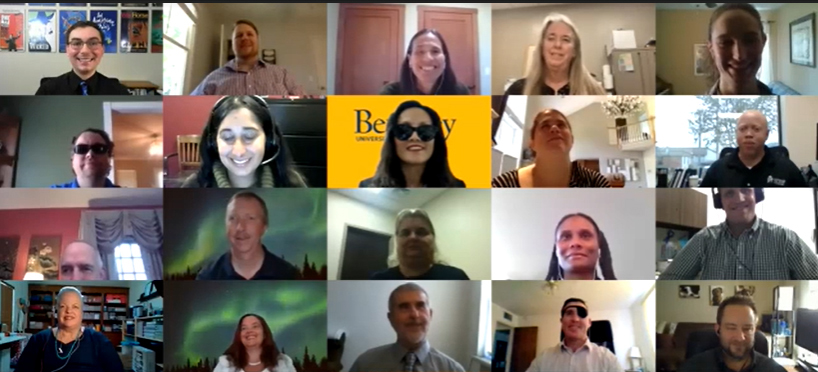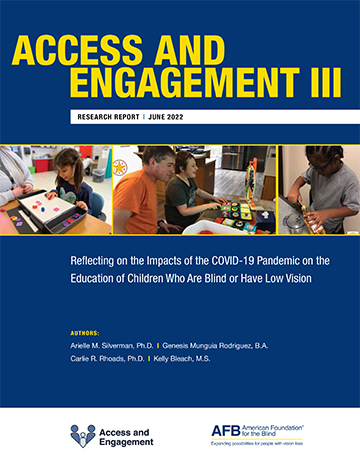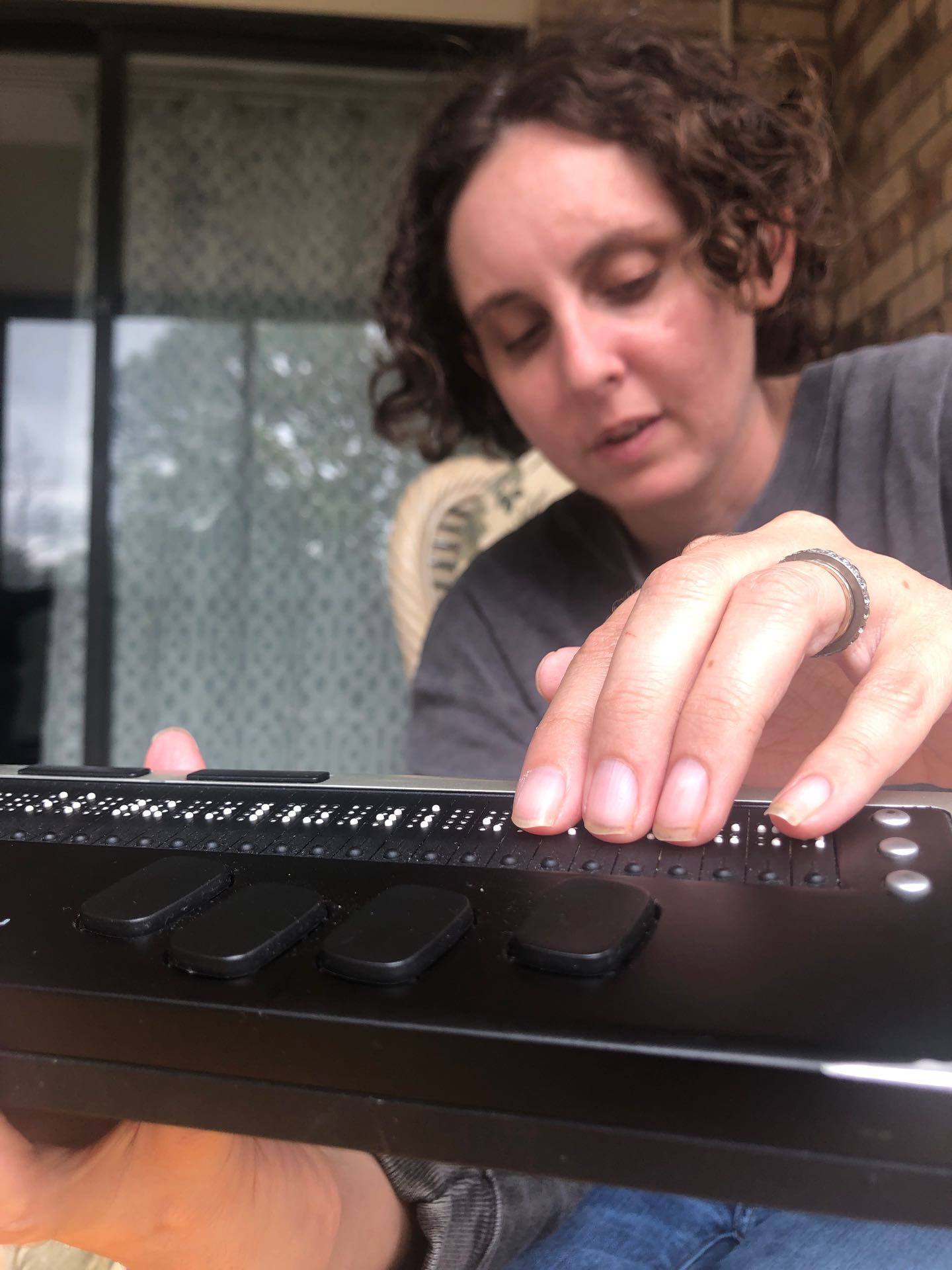Blind Leaders Development Program’s New Cohort is the Largest Yet
DONOR CORNER: Lifelong Blindness Advocate and Her Husband Leave a Lasting Legacy
Mind The Gap: AFB Report Provides Insights on Educational Challenges
Blind Leaders Development Program’s New Cohort is the Largest Yet
Designed to improve leadership skills and increase upward mobility, the program is growing with each new group.
The Blind Leaders Development Program was created in 2019 and produced its first graduating class in 2021. The program pairs Fellows with Mentors – both of which are blind or have vision loss – to give talented people leadership experiences that can improve their ability to rise to high-level positions in their careers.
Since the beginning, the program has seen a steady increase in applicants, Fellows, and Mentors. The third cohort, which began in summer 2022, is the biggest yet – and seven Fellows from the second cohort are now Mentors in this new cohort.
“They had leadership experience but maybe they just didn’t feel confident about being Mentors,” says Neva Fairchild, who oversees the program. “But because of this program they had the confidence and additional skills, they applied, and were selected as Mentors. We’ve also had a Mentor from our first cohort come back in the third cohort, because he feels his career has developed to a point where he can work with another Fellow. I think the Mentors are growing and learning, too, while they’re helping others grow.”
The program’s expansion is notable. According to Fairchild, the first cohort included 15 Fellows and 15 Mentors, the second included 18 Fellows and matched Mentors plus two additional Mentors, and the third cohort is made up of 25 Fellows and 25 Mentors.
Like previous cohorts, the current Fellows will receive extensive training in leadership, networking, communication, and other key skills to advance in their careers to higher levels of authority and improve their effectiveness as leaders. The group will follow the Leadership Challenge curriculum, attend twice-monthly webinars, and receive guidance about what it takes to succeed from their Mentors, who are already in leadership positions. They will also attend a leadership seminar at the 2023 AFB Leadership Conference.
The program is the source of many of the opportunities to network with other successful people who are blind or have low vision. For example, the Centennial cohort – the program’s second – and the third cohort met in August for the Centennial cohort’s graduation.
The graduation celebration, held in Louisville, Kentucky, featured various activities in addition to the ceremony, including a tour of the American Printing House for the Blind, a longtime AFB partner. After the ceremony, the third cohort stayed in Louisville for two days of training. Although the program uses asynchronous learning, Fairchild notes that the return of in-person training in April 2022 and the AFB Leadership Conference in May created yet more networking opportunities.
“The Centennial cohort just blossomed during those activities,” she says. “They gelled as a group, taking on planning, programming, and logistical aspects of the conference.”
Fairchild adds that the cohort has maintained those connections organically outside the program, creating a monthly book club and helping those in the cohort who wanted to learn braille, for example.
“That really excites me,” she says. “The program is inspiring them to take initiative, which is part of leadership.”
AFB is creating an opportunity for more formal continued networking, too, developing an alumni association so all program participants can stay connected.
“They’ll have access to current content that will help them keep growing,” Fairchild says. “And one of the attributes of a leader is that they are a lifelong learner.”
DONOR CORNER: Lifelong Blindness Advocate and Her Husband Leave a Lasting Legacy
An $8 million planned gift from Lou and Noah Alonso provides significant support for AFB’s programs.
Lulu (Lou) Johnson Alonso spent her entire adult life working with and advocating for people who are blind or have low vision. Since her husband, Noah, passed away in 2021, AFB has received nearly $7 million to date and is expecting $8 million total, thanks to a planned gift from their estate – a generous donation befitting the incredible work of Lou, who died in 2012.
Lou was a determined advocate for appropriate teacher preparation in visual impairment and deafblindness. Because of her dedication, she was a recipient of AFB’s Migel Medal in 2008, among many other honors including being inducted into American Printing House for the Blind’s Hall of Fame for Leaders and Legends of the Blindness Field in 2019.
The generous endowment Lou and Noah left to AFB will make a meaningful difference in our work to create a world of no limits for people who are blind or have low vision.
“Planned giving represents the largest financial commitment most donors will ever make,” says Meredith Gale, AFB’s chief development officer. “We understand the significance of these gifts to your family’s legacy, and we want to plan for and celebrate those gifts with you, just like we had the opportunity to do with the Alonsos.”
Lou and Noah’s endowment has been earmarked to support students who participate in various AFB Workforce inclusion programs, such as our Talent Lab and Blind Leaders Development Program, as well as for a new Research Fellowship in AFB’s Public Policy and Research Institute for graduate students and young scientists. Additionally, AFB will establish a merit-based college scholarship fund in Lou and Noah Alonso’s names for high school students who are blind or have low vision who are seeking higher education.
Born in 1925, Lou spent 50 years at Michigan State University, starting as a graduate assistant and, through the years, working as an assistant professor, associate professor, professor, and professor emeritus. She put her degree in Audiology and Speech Sciences and Education of the Visually Impaired and Blind to good use, overseeing the teacher preparation program in visual impairment at MSU for 39 years. Later, she launched and coordinated the school’s programs in deafblindness and Orientation & Mobility (O&M).
Lou was tireless in her advocacy, working in many state and national efforts in the field. She was a trustee and consultant to the Blind Children’s Fund, a major collaborator in the development of the Michigan Special Education Outcomes Guide and Assessments: Visual Impairment, and a member of the National Executive Committee for the development of the American Foundation for the Blind’s Hand in Hand: It Can Be Done project materials. Lou also authored many scholarly writings, including the foreword to Foundations of Education published by AFB in 2000.
Gale welcomes those interested in considering a planned gift to work with AFB. “We want to understand your intent and the legacy you wish to leave,” she says. “This allows AFB to plan appropriately for the necessary programmatic support to bring your hopes and dreams to fruition, and it also allows us to plan for a bright and balanced future of sustainability for our mission as a whole.”
Learn more about planned giving at AFB.
Planned giving represents the largest financial commitment most donors will ever make. We understand the significance of these gifts to your family’s legacy, and we want to plan for and celebrate those gifts with you. —Meredith Gale
Mind The Gap: AFB Report Provides Insights on Educational Challenges
Issues facing children who are blind or have low vision were amplified during COVID-19, and require action to improve education in the future.
AFB has been studying the impact of COVID-19 on students who are blind or have low vision, their families, and educators since spring 2020, and released our third Access and Engagement report in June 2022. All the reports are available in accessible format at AFB's Research on Education for Children with Visual Impairments During the COVID-19 Pandemic.
Access and Engagement III, builds on the first two reports. AFB conducted the third study for a number of reasons, says Arielle Silverman, Ph.D., director of research.
“We wanted to capture people’s experiences going back in person with schools reopening, but also to get a full year’s worth – and in some cases even 18 months – of reflection on the pandemic as a whole and how it impacted students overall during that time,” she explains.
The third study also differed from the first two because it was mostly qualitative – gathering information through focus groups and interviews about people’s experiences – instead of the quantitative, survey-based research used in the other studies.
“AFB has a lot of goals related to policy advocacy,” Silverman says. “We already had quantitative data showing that a lot of educational technology platforms were inaccessible. But to have a parent say, ‘My child cried every day because they couldn’t access their class independently’ is really powerful.”
The study also included interviews with administrators of schools for the blind and some Spanish-speaking parents. AFB made a concerted effort to include Spanish-speaking parents, including hiring a bilingual research assistant who conducted a lot of the outreach and interviews.
Among the key findings were that many digital platforms were not fully accessible or usable. Lack of reliable internet access was another barrier for some families. According to parents and educators, some subjects – such as Orientation and Mobility (O&M) – were difficult to teach online, and many students didn’t have a chance to receive in-person services or skill-building experience, which meant lost learning opportunities.
All of these factors led some parents to homeschool their children or enroll them in a school for the blind.
“Although it’s good some parents recognized the gaps and the need to change their child’s school placement, it just emphasizes how many kids are getting left behind in public school,” Silverman says.
In addition, Spanish-speaking parents said most communications from school were only in English, making bilingual educators essential to their children’s education.
“Overall, it’s striking how it seems the pandemic amplified and highlighted inequities that were already present,” Silverman says. “These things are not going to go away after the pandemic. Virtual education platforms are still going to be heavily used. So educators, technology companies, and everyone else needs to figure out how to ensure that virtual learning is accessible in the future.”
The AFB research team is disseminating the report to state special education directors, presenting it at relevant conferences, and using the findings to provide comments to the U.S. Department of Education. The team also plans to publish resource toolkits for youth, families, teachers, and school administrators.
Arielle Silverman: What Does the World Look Like to You?
We continue our series asking people who are blind or have low vision to share their employment journeys.
Arielle Silverman, Ph.D., was appointed as AFB’s director of research in April 2022, after being hired as a research specialist in September 2021. She earned a bachelor’s degree in Psychology and Biology from Arizona State University, a doctorate degree in Social Psychology from University of Colorado Boulder, and spent two years in a post-doctoral program at University of Washington. Early in her studies, she realized she wanted to understand the origins of prejudice and stereotyping of people with vision loss and other disabilities, and how it can be remediated. Dr. Silverman later established her own business, Disability Wisdom Consulting, which provided services such as research and analysis for clients including AFB, as well as inclusion training for organizations. Her book, Just Human: The Quest for Disability Wisdom, Respect, and Inclusion, is available on Amazon and can be purchased in accessible digital versions from her Disability Wisdom website.
When did you first experience vision loss?
I was born blind due to Leber congenital amaurosis. I attended a specialized preschool for blind children, where I learned braille, then went to public school.
What surprises people about your life?
I think people have an idea that if you have a disability that you’ve been through adversity or that life has been a struggle. In many ways, I’ve been very privileged, especially when I think about the average American in terms of socioeconomic status and resources. But I don’t think people should assume that because I’m blind that I had to overcome anything in my life.
What do you wish more people understood about what it means to be blind or have low vision?
Most of us just want to be treated like everyone else. Although people haven’t discouraged me professionally, I’ve had my fair share of people making assumptions about whether I need help. Recently, I was getting off an airplane and I had people try to grab the straps on my luggage without communicating verbally. If we need an accommodation or assistance, we’ll ask for it.
Have you ever been in a situation where people tried to put limits on your aspirations because of your vision loss? How did you have to advocate for yourself?
It’s been pretty rare. Although in graduate school I thought I might want to be a professor, so I worked as a teaching assistant. Some of the assignments teaching assistants got were really easy and others were very difficult. They kept giving me all the easiest assignments, so I had to advocate for myself to get the more difficult assignments, because I actually wanted to practice teaching.
What would true inclusion look like to you?
Ensuring that any information that’s shared in a visual modality is shared in a second or third way. If someone posts a picture on Facebook, I want to know what’s in the picture and why it’s important to the person who posted it. I don’t feel included unless people write a description, because the automated ones don’t do a great job. Or if someone is giving a presentation and there’s a graph on the slide, I’m not included unless the most important information is presented verbally.
AFB NEWS: Help AFB Put Every Dollar into Our Programs
We publish FOCUS four times a year because we want our supporters to know about our latest programs and initiatives to create a world of no limits for people who are blind or have low vision. Every issue of FOCUS is available online, with the same great content as the printed version—but every copy we don’t have to send in the mail saves us money.
At AFB, we want every dollar from our generous supporters like you to go toward our programs, such as research and employment initiatives. Plus, we care about protecting the environment and fewer mailings does just that.
Sign up to receive FOCUS in your inbox instead of your mailbox!


